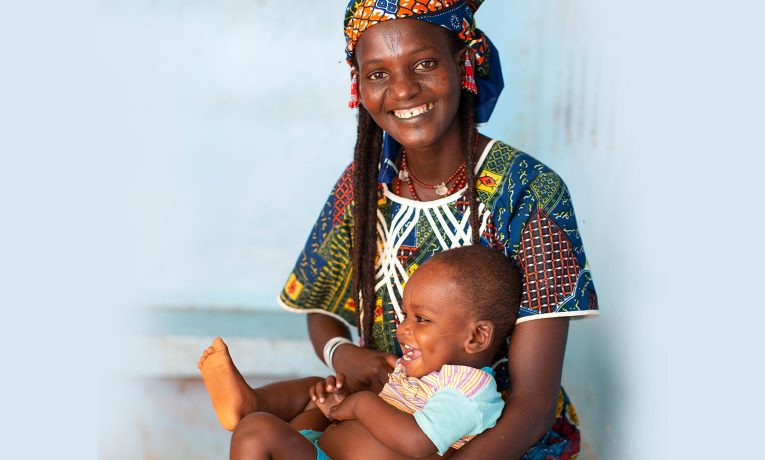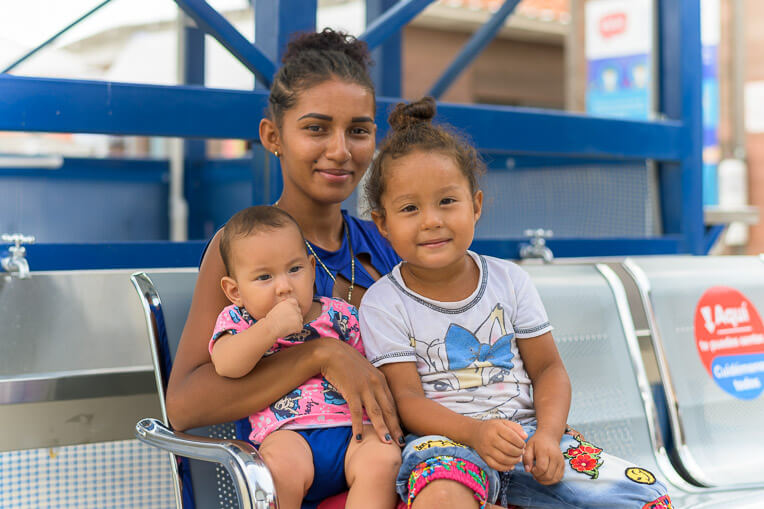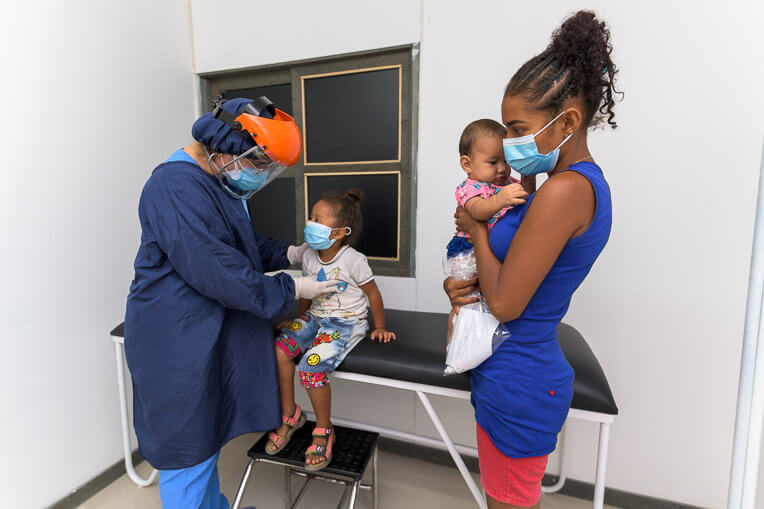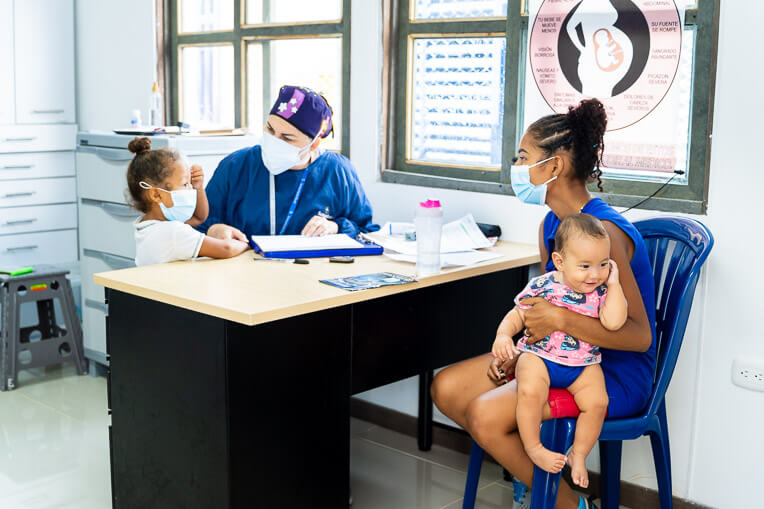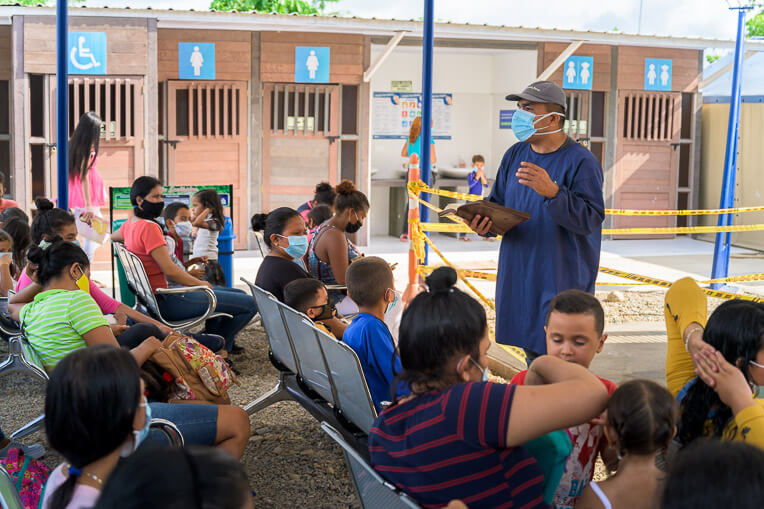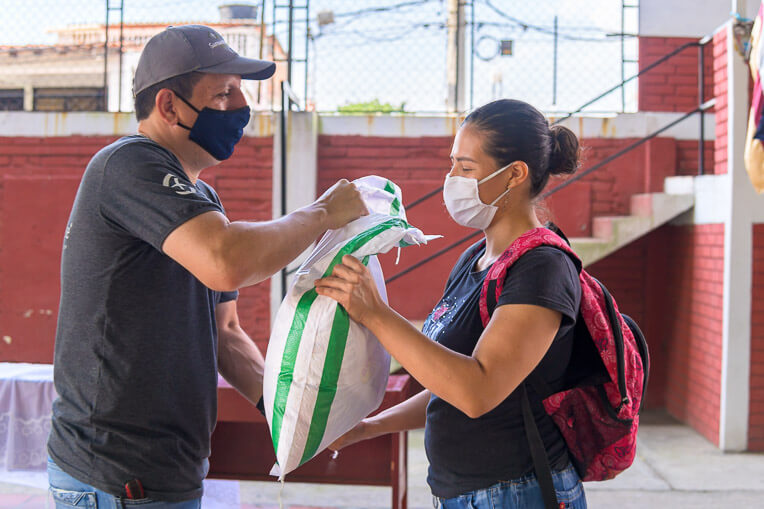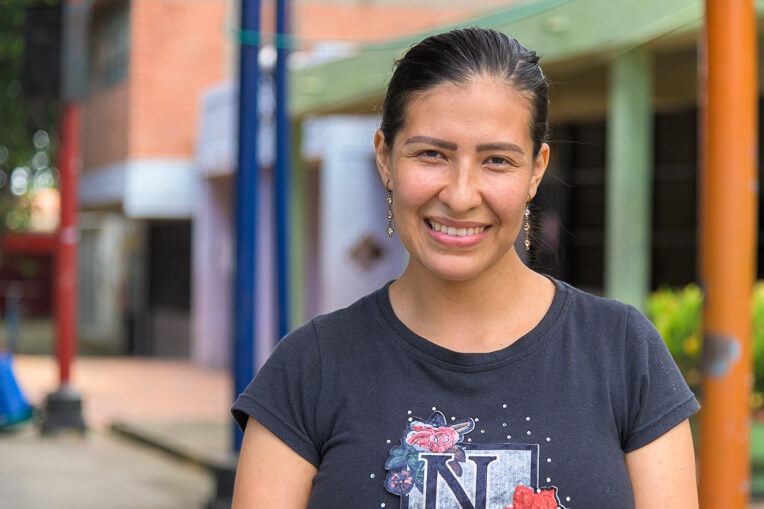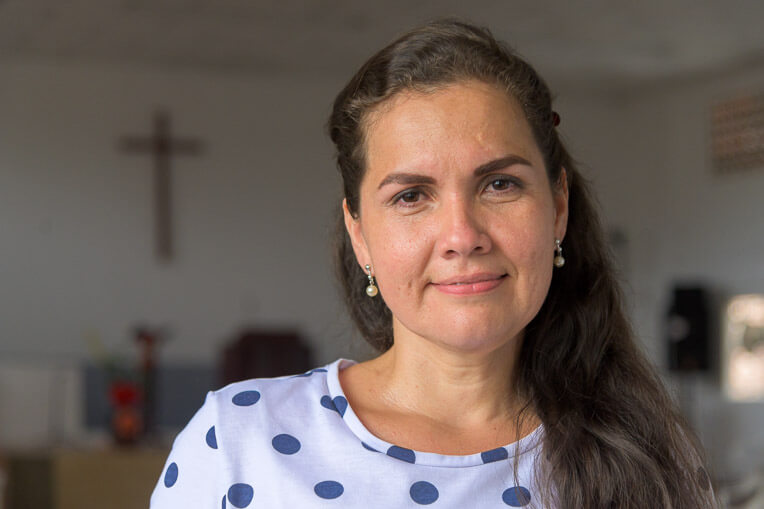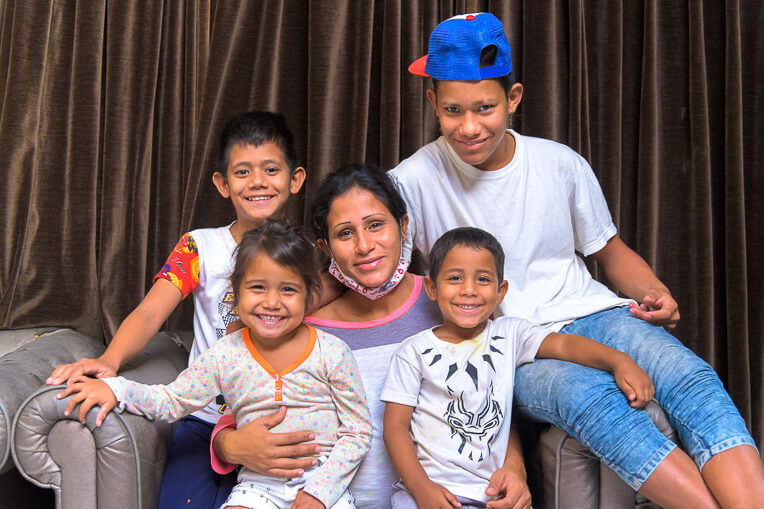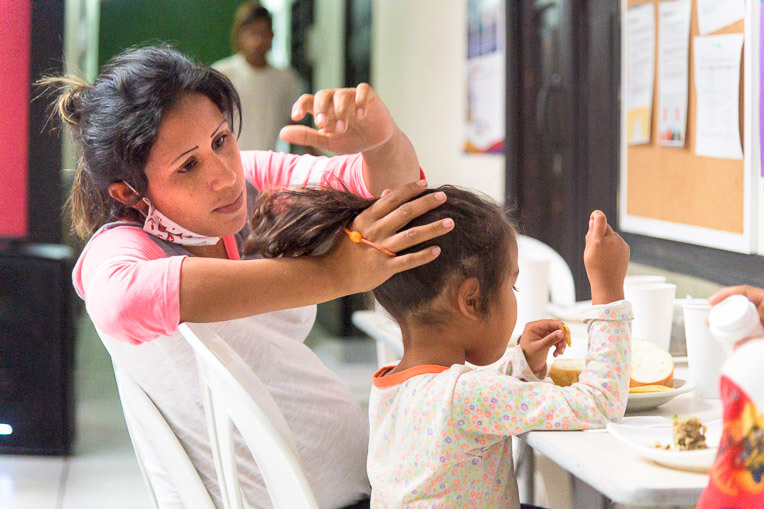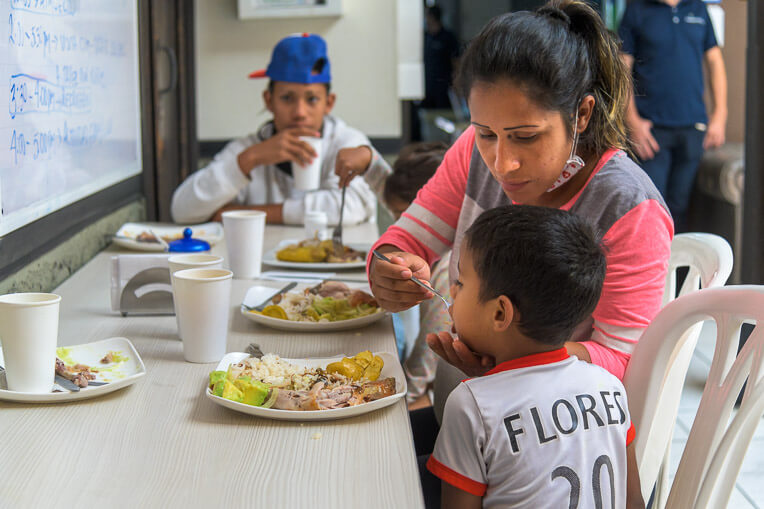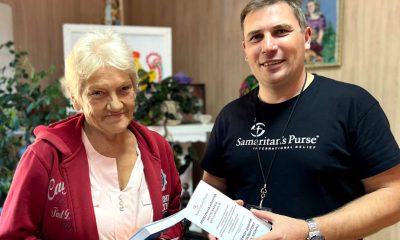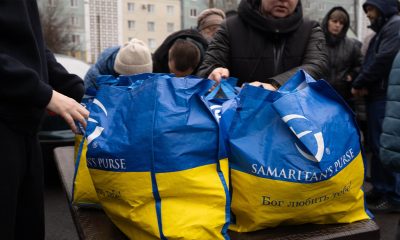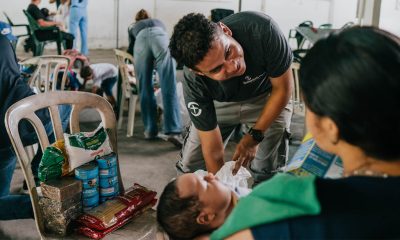Samaritan’s Purse is providing medical care and food to at-risk mothers and their children around the world. Find out what that looks like in Colombia for moms whose lives have been disrupted by the crisis in neighboring Venezuela.
In Colombia, Samaritan’s Purse is helping hundreds of mothers each month as we run a medical clinic, a food distribution program, and shelters for those on the move. Most of the women we help are Venezuelan migrants. Though their circumstances may be trying and painful, these women are undaunted, attempting to provide for their children in the best way they know how.
Caring for Moms and Children
In the lively border town of Puerto Santander, we’re offering a free maternal and child health clinic four days a week. We provide pre- and postnatal care, as well as basic medical services for both women and children. Our team includes two doctors, nurses, auxiliary nurses, and a dietician, among other staff members.
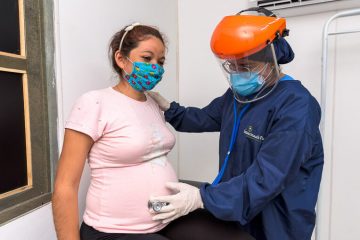
Dr. Adriana Marrugo sees Ninibeth, a Venezuelan migrant now in Colombia who is pregnant with her second child.
We assist anyone in need, but are especially focused on those who’ve recently left Venezuela and those mothers still living in Venezuela who can safely cross the border for care. The Venezuelan economy has nearly collapsed in recent years, leading to runaway inflation, a severe lack of jobs, hunger, a steep decline in medical services, and rising crime. More than 5 million people have fled the desperate nation over the past several years.
What our team sees on a daily basis is heartrending. “People are coming here crying and saying, ‘My boy doesn’t have anything to eat,’” said dietician María Fernanda Blanco. In the face of such suffering, our team not only treats physical problems but also addresses spiritual issues as well. In all our interactions, we are trying to demonstrate the love of God and share the hope found in Him.
“They are warriors. They fight for their children.”
“These women need to be loved and protected,” said Claudia Torres, health program coordinator for Puerto Santander. Despite dangers and difficulties, mothers are coming by boat, by motorcycle, and on foot, sometimes traveling two to three hours roundtrip to see a doctor. “They are warriors. They fight for their children.”
Yusleidy, 20, rode a bus for 45 minutes through Venezuela to the Colombia border. She then walked 25 minutes from the bridge to our clinic. Pregnant, this was her fifth prenatal checkup at our facility.
She was struggling to gain weight on a relatively meager diet—corn cakes with cheese for breakfast, soup for lunch, and a banana for dinner—but was encouraged by the practical assistance she received from our staff. “Through the help I’m getting here,” she said, “I know God exists and He is with me and I can get support in the middle of my suffering.”
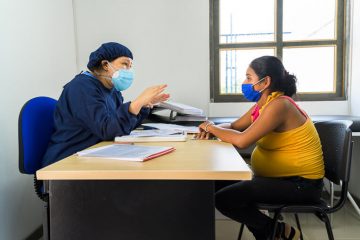
Dietician María Blanco counsels Yusleidy. This was her fifth prenatal visit to our clinic.
María Blanco worked closely with Yusleidy and felt like she was family. “We cry with the patients, we pray with the patients, and we get to see the change,” she said. “We know the seed won’t come back empty. More than the physical attention, we know this will bring people to Christ.”
Another patient, Wuileidy, 21, left Venezuela four years ago and now lives in Colombia. But she and her two children are still struggling. She survives by selling plantains on the street and also with help from her sister and brother-in-law, who is a fisherman in Puerto Santander.
Wuileidy relies on our clinic’s services. “This is the only alternative I have,” she said during her second visit to our outpost.
Her daughters, 4 years old and 6 months old, are both borderline underweight. The older child also complains of headaches, among other ailments. The Samaritan’s Purse clinic provided this young migrant mother with medicine and nutrition supplements. “We are very grateful,” Wuileidy said. She made another follow-up appointment for further care and to get test results.
Wuileidy was also intrigued by our chaplain’s presentation when the clinic opened that morning. Chaplain Eduard Vargas taught about rearing children and the importance of God’s Word, before offering a basic Gospel message. He also shared his personal testimony of how Jesus Christ brought order and “life” to his days.
“I really like hearing the chaplain,” Wuileidy said, noting this was the first time she had heard such things. Chaplain Eduard spoke further with her before she left and looked forward to talking with her again at her next visit.
Food in Time of Need
Our food distribution program in Colombia is also reaching those in great need, again often mothers with connections to Venezuela.
Blanca is a Colombian mother of three but lived in Venezuela for some time. Though she’s now back in Colombia, her husband had to return to his native Venezuela—which leaves her single parenting at the moment. She’s been unable to sell empanadas on the streets during the pandemic, which means sometimes she doesn’t have enough money to provide food for her children. She was grateful to recently receive one of our mercados, or food baskets, at a local elementary school.
“I feel blessed today,” Blanca said after receiving bags of flour, rice, beans, cornmeal, and other essentials. She considered the food distribution to be an answered prayer for her children. “I’m asking God to provide for them.”
Cheila Rodríguez works at a church in downtown Cúcuta that partners with Samaritan’s Purse to provide food to those in need. A mother herself, Cheila’s heart breaks for the many Venezuelan mothers and children who now find themselves homeless in Colombia. But with no food, no work, and no medicine in Venezuela, they keep coming. So, Cheila does what she can to facilitate the food distributions and then follows up with women in need, helping address physical and spiritual issues.
“The children,” she said, “it’s so sad they have to live through this—to sleep on the streets and have nothing to eat. That’s what breaks my heart. But, it gives me peace to see Jesus working in their lives.”
Fears Relieved
Finally, Samaritan’s Purse operates two shelters in Colombia that provide for Venezuelan migrants, including many mothers. One, near the border city of Cúcuta, offers a Christian welcome, hot meals, and an incredible array of practical items for the road. Families generally only stay one night.
In Bucaramanga, about 120 miles southwest of Cúcuta, we operate a longer-term shelter, primarily for migrant mothers with young children. Some are pregnant or have just given birth. Most, without some kind of intervention, would be on the streets.
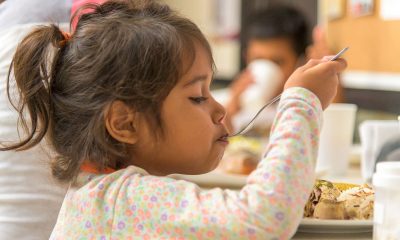
Maria’s daughter has a hearty meal at our shelter in Bucaramanga.
With us, families can stay in a refurbished hotel, all meals provided, for up to two months or so—until they can secure a more stable living situation in the city or elsewhere. Basic medical care is offered, as well as a number of classes and activities aimed at both moms and their children.
Maria, a 32-year-old single mother and migrant from Venezuela, was referred to our Bucaramanga shelter with her four children. She was also seven months pregnant with her fifth child at the time. They had spent several days walking over the mountains from Cúcuta and received only one ride—over the coldest plateau. Then they spent a few more days living in the city.
“I begged for food on the streets,” Maria said, breaking down in tears. “It was horrible. My biggest fear is to be on the street again, with my children, alone.”
Maria was also terrified to give birth in Venezuela as she had little money, and each item (blankets, diapers, medicine) is billed separately. She said she had heard of women not being able to afford a C-section and their babies died in the womb. Even in better cases, doctors and medicines are scarce now in Venezuela. “When we give birth [there], our children die,” she said.
“I feel really good and grateful to God.”
Our staff cared for Maria and her family in many ways, including providing ultrasounds at the clinic and arranging transportation to and from the hospital in light of her high-risk pregnancy.
“I feel really good and grateful to God,” she said. “They’ve helped us a lot.”
Maria said her hope, upon leaving the shelter, was to find a job as a restaurant cook. She doesn’t expect to give her kids luxuries, she explained, just the basics.
“I want to work to give them what they need,” she said.
Because that’s what mothers do.
